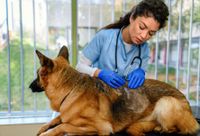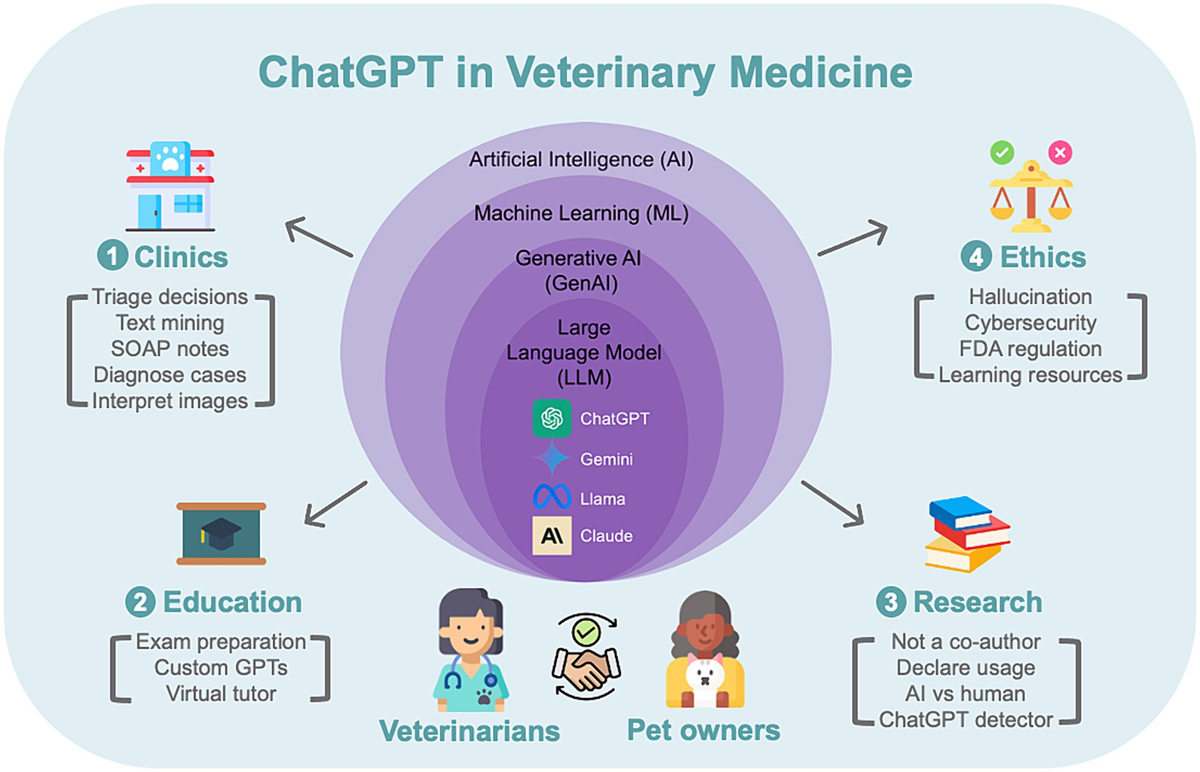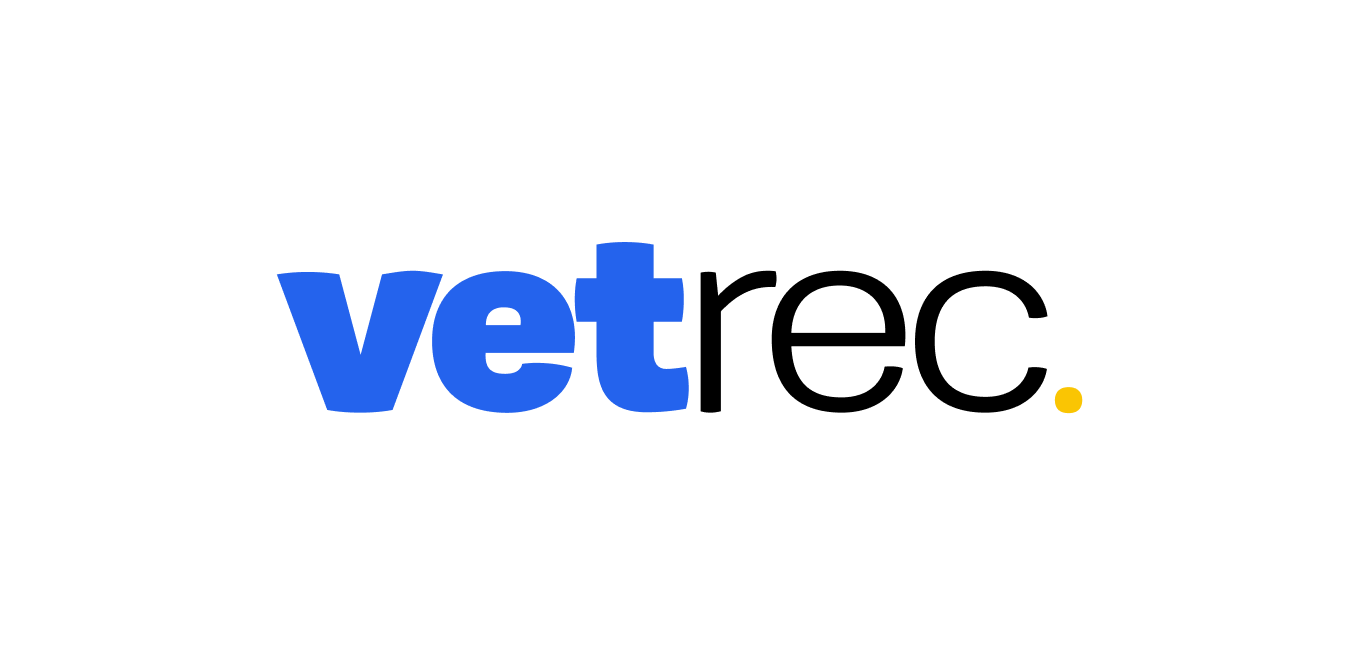Explore web search results related to this domain and discover relevant information.

AI tools can help pet parents research symptoms or ask better questions. They can even help your vet take notes during an appointment, but they can not replace your veterinarian. Only your vet has the experience, training, and hands-on knowledge necessary to treat your dog.
Recently, many pet owners have harnessed the wide-ranging power of AI to research their dogs’ symptoms and health conditions. While AI vet med does have its place, it’s important to understand when AI is appropriate to diagnose a dog and when you need to consult with your veterinarian.This article explores how to use AI to diagnose a dog, when to rely on AI and when to rely on your veterinarian, and why accreditations like AAHA’s are critical to providing your dog with the best healthcare he or she deserves.When checked regularly, you’ll be able to spot changes right away. If you notice a lump or bump on your dog’s body, bad breath or bleeding gums, an elevated temperature, a change in mood or energy level, and so on, you can get your dog into the vet for a checkup.Choose your favorite AI tool and describe your dog’s symptoms, list your concerns, and pose the questions on your mind related to the symptoms. Then, request that it formulate a list of 10 questions to take to your veterinarian. Refine as needed, of course, but you’ll show up to your appointment less afraid because you’ll have guiding questions to assuage your concerns.
All accounts starts with a free, 14-day trial and use our strongest, most accurate AI model to protect you and your patients · Ideal for getting started. For veterinary professionals who want to go home on time with detailed, complete notes.
Read about how ScribbleVet is partnering with the University of Florida College of Veterinary Medicine!Runs on AI models tuned for veterinary medicine that can be tuned to your preferred level of detail.Quickly transfer your SOAP notes to your PIMS with a single click! Available for: ezyVet, Pulse, Vetspire, and more.Scribble is amazing technology! It really understands vetmed and lets my technicians keep their hands free to focus on the patient instead of taking notes.
Front. Vet. Sci., 07 June 2024 · Sec. Comparative and Clinical Medicine
ChatGPT, the most accessible generative artificial intelligence (AI) tool, offers considerable potential for veterinary medicine, yet a dedicated review of its specific applications is lacking. This review concisely synthesizes the latest research and practical applications of ChatGPT within the clinical, educational, and research domains of veterinary medicine.It intends to provide specific guidance and actionable examples of how generative AI can be directly utilized by veterinary professionals without a programming background. For practitioners, ChatGPT can extract patient data, generate progress notes, and potentially assist in diagnosing complex cases.Veterinary educators can create custom GPTs for student support, while students can utilize ChatGPT for exam preparation. ChatGPT can aid in academic writing tasks in research, but veterinary publishers have set specific requirements for authors to follow. Despite its transformative potential, careful use is essential to avoid pitfalls like hallucination.This review addresses ethical considerations, provides learning resources, and offers tangible examples to guide responsible implementation. A table of key takeaways was provided to summarize this review. By highlighting potential benefits and limitations, this review equips veterinarians, educators, and researchers to harness the power of ChatGPT effectively.

We may receive compensation when you click on links to products we review. Please view our affiliate disclosure. ... The veterinary field is undergoing a transformation through AI-powered tools that enhance everything from clinical documentation to cancer treatment.
In this guide, we’ll explore some of the groundbreaking AI veterinary tools that demonstrate the incredible potential of artificial intelligence in animal healthcare, from smart collars that monitor vital signs to sophisticated oncology platforms that process billions of data points.The platform combines advanced speech recognition with specialized veterinary AI models, transforming how animal healthcare providers handle clinical documentation while maintaining high standards of patient care.Automated PIMS integration architecture for seamless record transfer · Team collaboration system with real-time editing capabilities · Specialized template processing engine for diverse clinical scenarios ... Vetology functions as an advanced AI diagnostic center where machine learning systems process veterinary imaging data to provide rapid clinical insights.The platform combines sophisticated image recognition technology with teleradiology services, transforming how veterinary practices approach diagnostic imaging while maintaining high accuracy standards through AI-human collaboration.

Vets, breathe easy. Our Ai has you covered. CoVet’s easy Ai will do your admin work so you can focus on the things that matter most.
It’s made it super efficient and actually getting home on time to spend with family. My medical records are complete and actually well done according to my colleagues. This has never happened in the 25 years I’ve been doing this, by the way!" —Dr. John Brajkovich, Caledon Mountain Veterinary HospitalCoVet's best-in-class feature-suite, designed with the support of on-team, practicing DVMs, boosts efficiency while alleviating administrative burnout for Vets."I had tears in my eyes after trying CoVet because my day just got a million times easier. You have eliminated the absolute worst part of being a vet..."More than a veterinary AI scribe—CoVet is a revolutionary veterinary AI copilot, automating SOAP notes, managing records, and simplifying your day.

An AI assistant for veterinarians to work more efficiently before, during, and after their consults. Try now for free!
Spend more time with pets not with documentation. VetRec is the veterinarian's best friend. ... No credit card required. ... Transfer notes into your PiMS and share discharge notes with your clients.You’ll spend less time typing and more time connecting with clients and pets. Every vet and pet are different.Meet Diagnostic Assistant for Veterinary Insights and Differentials—or DAVID for short. Our chat-based agent can help you with any of your cases like providing possible differentials, dosage calculations, and educational material.Collaborate with your team more efficiently by setting controls on who has access to what and assigning clear steps that your practice follows. VetRec can understand and generate notes in multiple languages. Talk in Spanish and get notes in English. Have a French-speaking client?


Animal rights organisation GAIA has launched a campaign featuring AI videos of pets to call for a lower VAT rate for visits to the vet. On a...
GAIA is calling for a reduction in VAT on animal care to 6 per cent, as is the case for livestock farmers. Currently, the rate for private pet owners at the vet is 21 per cent.On a campaign website of GAIA, people can create an animated video in which their pet addresses the federal finance minister Jan Jambon.The organisation believes that the current system follows “a twisted logic” that “says a lot about the priorities of the current system”. “Caring for an animal is not a luxury.It is a basic need that plays an important role in the daily lives of millions of Belgians with a pet,” says GAIA in a press release.
To get a sense of how AI is transforming the animal health space, Cornell University College of Veterinary Medicine hosted the first Symposium on Artificial Intelligence in Veterinary Medicine (SAVY) April 19-21 at its Ithaca, New York, campus.
Like any technology, AI is intended to improve our lives, by solving complex problems, automating tasks, and improving efficiencies and decision-making. Veterinary medicine was slow to embrace AI, but that is changing.On the first day of the symposium, Sebastian Gabor, cofounder and CEO of Digitail, a cloud-based practice management software (PIMS) that uses AI to increase productivity, presented findings from the first industry-wide survey on AI in veterinary medicine.Of the approximate 83% of respondents who reported familiarity with AI, nearly 30% of them said they already incorporate AI into their practices, either on a daily or weekly basis. The finding surprised Gabor. He explained that it indicates veterinarians scored high on the adoption curve, meaning they are quick to seize on new technology, including seasoned practitioners.It turns out veterinarians of all generations, including those approaching retirement, are excited to learn about AI voice-to-text tools that quickly transcribe client conversations and incorporate the information into the patient’s medical record.

Artificial Intelligence (AI) is quickly changing how veterinary medicine works in the United States. For veterinary clinics, hospitals, and animal care places, AI is not just a future idea; it is a real tool that helps improve clinical decisions and makes operations run better.
This article looks at how AI technology is changing clinical practice in veterinary medicine. It focuses on how AI helps with decision-making, improves care quality, and changes daily workflows. Examples from companies like LifeLearn and clinics using AI show how these changes happen.The article also explains what leaders need to know about tools like AI chatbots and decision-support systems and how these affect staff and clients. Veterinarians in the U.S. are using AI tools more and more. These tools help with diagnosing diseases, suggesting treatments, and managing patient care better.LifeLearn, a medical education provider for veterinary medicine, has made AI tools like ClientEd with Ask Eddie and the Sofie decision-support tool. These systems give veterinarians quick access to thousands of health handouts and diagnostic info that vets have approved.Ask Eddie lets pet owners get instant, reliable answers to common health questions. This helps veterinary teams focus on emergencies and manage appointments. Sofie gives instant suggestions for diagnoses, different possible diagnoses, and treatment options through a simple AI conversation.
Our solutions make great pet care accessible and affordable, engaging owners in pet health in revolutionary ways. We rigorously validate our solutions through extensive real-world testing with pet owners, veterinary experts and industry bodies.
Our industry faces a crisis of disengaged pet owners. Vet costs are rising, creating a barrier between owners and quality care.Our obsession with accuracy is driven by our desire to deliver world class pet care.


Pet owners can use the Fi mobile app to get information and share the data with veterinarians.
"I realized when I go in the office with my dog, people are giving treats all the time behind my back," he said. "I was looking at the chart when it comes to his feeding, and I was like, ‘Wait, it has to be a bug.’ ... Pet parents can share data from the Fi Series 3+ with veterinarians."We really think it’s going to become a key pillar of what the next generation of vet care and healthcare is going to be for dogs," Bensamoun said.A new AI-powered dog collar from Fi tracks pet health metrics, including scratching, licking and location, is helping owners monitor wellness indicators and share data with veterinarians.Fi launched the world's first AI-powered dog collar tracking scratching, licking, sleep cycles and location to provide pet parents insights about their dog's well-being.

Artificial intelligence isn’t just transforming human healthcare—it’s shaking up veterinary medicine too. From supercharged diagnostics to smart practice management, AI is becoming a game-changer for animal care. And now, BMC Veterinary Research is putting out the call for researchers ...
Artificial intelligence isn’t just transforming human healthcare—it’s shaking up veterinary medicine too. From supercharged diagnostics to smart practice management, AI is becoming a game-changer for animal care. And now, BMC Veterinary Research is putting out the call for researchers to help define what comes next.The journal has launched a new article collection titled “Artificial Intelligence: Applications in Veterinary Medicine,”and submissions are officially open. Guest edited by Dr. Giovanni Pietro Burrai (University of Sassari, Italy) and Dr.And now, BMC Veterinary Research is putting out the call for researchers to help define what comes next.Simon Castillo (MD Anderson Cancer Center, USA), the collection aims to highlight cutting-edge research at the intersection of AI and veterinary science.

What AI vet products are taking the industry by storm for greater animal healthcare? This guide explores the many ways that new technologies are enhancing patient care and operational efficiency in vet clinics. Applications of AI in Veterinary Medicine Read More…
Countless industries are gradually implementing artificial intelligence, and the field of veterinary medicine is no different. What AI vet products are taking the industry by storm for greater animal healthcare? This guide explores the many ways that new technologies are enhancing patient care and operational efficiency in vet clinics.Sick dogs and cats often undergo diagnostic imaging tests so veterinary teams can determine the problem and recommend solutions. After taking X-rays, ultrasounds, or MRI scans, professionals have to interpret the images to make a proper diagnosis.Vets who deploy these resources enjoy several benefits. Nobody is perfect. Human error is possible when assessing symptoms and diagnostic images.AI vet tools support personalized treatment plans by analyzing patient data to identify risks and assess outcomes. For example, a machine can review all chart notes and consider important factors like the pet’s breed, age, and health conditions.

Sahil Lavingia at his office in Brooklyn Credit: Ben Sklar for ProPublica · Lavingia did not have much time to immerse himself in how the VA handles veterans’ care between starting on March 17 and writing the tool on the following day.
Under a time crunch, Lavingia said he finished the first version of his contract-munching tool on his second day on the job — using AI to help write the code for him. He told ProPublica he then spent his first week downloading VA contracts to his laptop and analyzing them. VA press secretary Pete Kasperowicz lauded DOGE’s work on vetting contracts in a statement to ProPublica.Decisions to cancel or reduce the size of contracts are made after multiple reviews by VA employees, including agency contracting experts and senior staff, he wrote. Kasperowicz said that the VA will not cancel contracts for work that provides services to veterans or that the agency cannot do itself without a contingency plan in place.At the core of Lavingia’s prompt is the direction to spare contracts involved in “direct patient care.” · Then, evaluate if this contract is "munchable" based on these criteria: … - Level 0: Direct patient care (e.g., bedside nurse) - NOT MUNCHABLE - Level 1: Necessary consultants that can't be insourced - NOT MUNCHABLE - Level 2+: Multiple layers removed from veterans care - MUNCHABLE - Contracts related to "diversity, equity, and inclusion" (DEI) initiatives - MUNCHABLE - Services that could easily be replaced by in-house W2 employees - MUNCHABLEAs the Trump administration prepared to cancel contracts at the Department of Veteran Affairs this year, officials turned to a software engineer with no health care or government experience to guide them.
Vet.AI is a 24/7 AI-powered pet health consultation hub, providing Instant AI Veterinary Answers, a fast and seamless voice Q&A experience, and comprehensive Disease Prevention Management. Inheriting from the medical-grade Dr.AI, Vet.AI offers pet owners instant, reliable professional advice, ...
Vet.AI is a 24/7 AI-powered pet health consultation hub, providing Instant AI Veterinary Answers, a fast and seamless voice Q&A experience, and comprehensive Disease Prevention Management. Inheriting from the medical-grade Dr.AI, Vet.AI offers pet owners instant, reliable professional advice, along with personalized care guidance based on their stored pet profiles.Vet.AI offers instant access to AI-powered vet consultations, available 24/7 to provide expert advice and immediate pet care support anytime, anywhere.Through real-time consultations, Vet.AI helps detect and prevent potential health issues early, ensuring proactive pet care and long-term well-being.With voice input and smart wording suggestions, Vet.AI makes interactions effortless, allowing pet owners to quickly receive urgent solutions and expert guidance.

Artificial intelligence in veterinary care offers many useful benefits. AI systems help make diagnostics faster and more accurate. They also assist with watching patients and make administrative work easier. For veterinary managers and owners, using these technologies can make clinic operations ...
Artificial intelligence in veterinary care offers many useful benefits. AI systems help make diagnostics faster and more accurate. They also assist with watching patients and make administrative work easier. For veterinary managers and owners, using these technologies can make clinic operations run more smoothly and help manage resources better.For example, Mars Petcare’s RenalTech uses AI to predict chronic kidney disease in cats up to two years before any symptoms show up. Finding the disease early means treatment can start sooner, helping cats live healthier lives. In veterinary cancer care, tools like ImpriMed use machine learning to guess how well drugs will work for dogs with lymphoma.AI’s ability to look at large amounts of data quickly is very useful for veterinary diagnostics. Many clinics use AI-powered radiology tools such as SignalPET and Radimal. These tools help vets read X-rays and other images more quickly and more correctly.Besides imaging, AI helps in other diagnostic areas by interpreting lab results and biopsies with smart image recognition. For example, AI helps with studies of tissues and parasites by pointing out specific parts of samples. These tools save vets time.
Web site created using create-react-app

Vet-AI has revealed that its new automated triage tool outperforms Google’s Gemini and OpenAI’s ChatGPT in both clinical accuracy and triage effectiveness
Animal healthcare startup Vet-AI has announced the results of its latest testing, revealing that its new automated triage tool outperforms Google’s Gemini and OpenAI’s ChatGPT in both clinical accuracy and triage effectiveness. In a blind comparison conducted in April 2025, vets reviewed 48 simulated pet-owner conversations generated by Vet-AI, Gemini 2.0 and ChatGPT 4.0.The vets evaluated each on clinical accuracy, triage effectiveness and the subjective criteria of factuality, integrity, safety, empathy and readability. Vet-AI’s Large Language Model (LLM) achieved an accuracy score of 81 percent, surpassing Gemini (69 percent) and ChatGPT (50 percent).Vet-AI’s model also stopped triage at the correct point in 81 percent of cases according to the vets, compared with Gemini’s 75 percent and ChatGPT’s 56 percent. Vet-AI’s tool also outperformed the leading LLMs on subjective measures, delivering more empathetic, thorough and factual responses to pet owners.Vet-AI’s automated triage product is trained on more than 400,000 video vet consultations from UK licensed vets. In total, Vet-AI has collected more than 4 billion data points during the development process. The live model is undergoing continuous development, allowing Vet-AI to closely monitor performance, gather feedback and work alongside veterinary experts to constantly refine the model.

Employees in the Department of Government Efficiency reportedly used a flawed artificial intelligence model to determine the necessity of contracts in the Department of Veterans Affairs, resulting in hundreds of contracts, valued at millions of dollars, being canceled.
The VA initially announced, in February, it would cancel 875 contracts. But various veteran affairs advocates sounded the alarm, warning that some of those contracts related to safety inspections at VA medical facilities, direct communications with veterans about benefits, and the VA’s ability to recruit doctors.Lavingia acknowledged the AI model was flawed, but he assured ProPublica that all “munchable” contracts were vetted by other people.Kasperowicz added the department is reviewing all 76,000 active contracts to ensure each one is a “good use” of taxpayers’ money and is benefitting veterans.“VA does not cancel contracts unless they are no longer needed or the department has contingency plans in place to ensure continuity of services and no negative impacts to Veterans or VA beneficiaries,” Kasperowicz said.
If you have any questions not answered in the FAQ, please do not hesitate to contac us. Vet Chatbot uses natural language processing and machine learning algorithms to understand your questions and provide personalized advice for your pet's healthcare needs.
Simply type your question into the chatbox, and our virtual assistant will provide you with expert advice. No, Vet Chatbot is not a substitute for professional veterinary care.Access our AI-powered virtual veterinarians anytime, anywhere, day or night, to get the advice and support you need.Create an account and select your preferred AI-Vet agent based on their specialty and expertise.Initiate a new chat with your AI-Vet agent, and utilize the Prompt Library provided to convey your pet's symptoms and health history.








